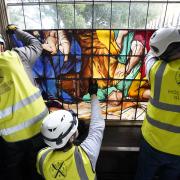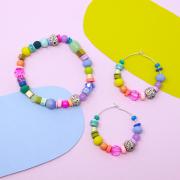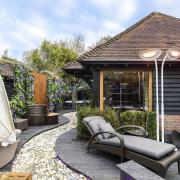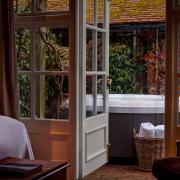When mumpreneur Deborah Campbell from Winchester launched her own designer label in 2015, a crusade to find an alternative to ‘fast fashion’ soon took off. Viv Micklefield meets the woman turning trash into clothes to treasure

“To produce fashionable clothing ethically is hard,” admits Deborah Campbell. “All of my previous knowledge I’ve had to put in a box and look at it with different glasses on because it doesn’t work using the production processes that I’m familiar with. And that’s been an almighty learning curve.”
True to the level of advance planning demanded by the fashion industry, Deborah is already hard at work on her 2017 collection of ready-to-wear women’s clothing. However, sitting in her studio, at home in Winchester, the words ‘fast’ and ‘fashion’ are no longer on a collision path. As she goes on to explain, that’s because two decades after graduating as a designer, she made the bold decision to take a different, and more sustainable, route. Firstly, by putting her war on waste into practice by steadfastly refusing to buy any new clothes for a whole year and secondly, by starting-up her own business.
“I’d already become disillusioned after my first ten years of working in the fashion industry. With manufacturers being asked to make things cheaper and cheaper I thought, this just does not make sense.
“That wasn’t my light bulb moment, as such, but then, having gone on to work for some of the biggest names in retail it demonstrated to me, again, that everything is driven by cutting prices. We’re talking about the future of the planet here, it’s a massive deal.”
You could say that 44-year-old Deborah’s passion for fashion is in the genes: her mum worked as a seamstress in factories producing clothes for High Street chains and together with her grandfather, who was also employed in garment making, regularly used to run-up clothes for the family. So she knows a thing or two about how challenging it is to make a difference.
“One of the ways is to use mills and manufacturers who are ethical, that’s where it really starts. It’s all about the raw material, who’s making it up, and who are the innovators?
“I absolutely love fabric and I think that there will be some huge developments over the coming years. In particular, I really hope that we’ll see lots more fabric being recycled and the technology put in place to achieve this.”
Sourcing British was her first priority. This supports our manufacturing heritage and the economy whilst immediately slashing the carbon footprint, compared to imported clothing. Fibres found in wood pulp then also made their way into her collection as did the latest addition to her current portfolio which uses fabric made from, of all things, recycled plastic bottles. But is she compromising wearability or comfort by taking the moral high ground and shunning the familiar natural fibres that many of us crave?

“The fabric that I use is a weave with a satin finish,” says Deborah. “It’s really soft and feels great. Basically it’s a polyester, which unfortunately doesn’t always get a good press, but this is definitely a fibre for the future.
“What we need to do is to find a way of ‘reinventing’ cotton because its production is hugely detrimental to the environment. And it’s not just about the amount of water cotton needs to grow, there’s concern about the pesticides used which affect the health of the farmers and their families.”
Her careful choice of production processes bring added benefits too. Digital printing, for example, requires less harmful inks and, again, uses less water. And, while some designers might baulk at passing the added costs on to their customers, Deborah actively celebrates the fact that these garments have an individuality and a season-less style that means they become wardrobe staples to treasure.
In fact, just like one of her catwalk icons Stella McCartney, who has long championed a more ethical approach to fashion, Deborah’s creativity seems to have been unleashed. There’s proof of this is in her Summer Breeze artist collection which features a stunning abstract print based on the paintings of Winchester trained artist Tabitha Wilson. And whether it’s a top, or a dress, by cutting as many pieces as is possible from a single length of fabric, no two garments will ever be identical. That’s a ‘look’ which Deborah says isn’t easy to achieve in the commercial world.
“It’s taken Stella (McCartney) a long time to get to where she has. And for me it’s a particularly hard slog as I’m producing a small range and people might not always like it, but I’m in this for the long haul. My husband and I used our savings to set this business up, and it’s still just the two of us involved. But I shall probably look at crowd-funding as a way to grow it further.”
Deborah’s first collection may only have been launched on to the market last spring, however it quickly received a huge thumb’s-up when High Street retailer Anthropologie bought her ‘Poppy’ dress and put it straight into the window of their flagship Regent Street store in London. Support has also come from online stores promoting British made brands, and her own website, www.deborahcampbellatelier.com provides a ready showcase for her latest designs. It also highlights a charitable cause that’s dear to her heart.
“The other collaboration I currently have is with an international charity called the Phoenix Foundation. This was co-founded by another Winchester resident and friend of mine Catherine Skinner, together with Dr Saleyha Ahsan (who’s a familiar face on BBC TV’s The One Show and Trust Me, I’m a Doctor). The Foundation provides emergency medical equipment to treat children burned in war zones like Syria and a percentage of the sales from my Bee the Change T-shirt goes directly to the charity.”
Whilst a stand against disposable fashion perhaps sounds both admirable and business suicide in equal measures, Deborah remains realistic in her ambitions to change the way we shop for our clothes.
“The true ‘cost’ of fashion in terms of global inequality and environmental destruction is such an important message to get across, so let’s at least try and do things in a different way,” she says.
“Nothing can be truly ethical and sustainable, I’ve come to realise this. But to be able to say that you’ve ticked as many boxes as possible is an important step.”
My favourite Winchester
• Place to eat: I love Black White Red in Jewry Street for coffee or brunch, and usually head to either Forte Kitchen on Parchment Street or vintage emporium Molly’s Den on Moorside Road for lunch. The Japanese restaurant, Kyoto Kitchen is a favourite for dinner out.
• Place to shop: The Hambledon in The Square is great for shopping, so too is Jewry Street’s The Consortium.
• View: The walks around St. Catherine’s Hill are lovely.
Deborah’s A/W16 tips
“For Autumn/Winter 2016 it’s a looser look with a real push towards individualism when it comes to prints. The 70s vibe is still going strong with feminine ruffles, which together with 90s grunge references, carries a hint of the modernist eccentric. Purple and butterscotch are two key colours. For Spring/Summer 2017, I’ll be including more garden florals, with a focus on some Hampshire favourites.”
Ethical shopping spots
• Rapanui - Eco brothers Rob and Martin Drake-Knight make organic, ethical clothing using renewable energy in their home town of Sandown on the Isle of Wight; their range includes T-shirts, hoodies, leggings and underwear. www.rapanuiclothing.com• Spirit of nature - Natural and environmentally friendly products are the signature of this Lymington outfit who’ve been selling adult and baby loungewear made from organic cotton, hemp and bamboo, for the past decade. www.spiritofnature.co.uk



























